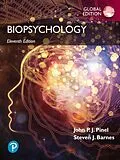Learn more about how the central nervous system governs human behaviour with an industry-leading text.
Biopsychology, Global Edition, 11th Edition by authors John Pinel and Steven Barnes presents a clear, engaging introduction to the topic offering a unique combination of biopsychological science and personal, reader-oriented discourse, ideal for students studying Physiological Psychology and Biopsychology courses.
Well-known for its accessible and student-focused approach to the discipline, the book successfully interweaves the fundamentals of the field with clinical case studies, social issues, personal implications, useful metaphors, and memorable anecdotes.
The plethora of themed features, and visual illustrations will challenge your critical thinking skills and support your understanding of the concepts introduced.
The latest Edition also incorporates two new emerging themes (Thinking About Epigenetics" and "Consciousness") and includes up-to-date coverage of the most recent developments in the field.
Autorentext
John Pinel is an Emeritus Professor at the University of British Columbia in Vancouver, Canada. An award-winning teacher, he is the author of more than 200 scientific papers. He feels that Biopsychology is his major career-related accomplishment.
Steven Barnes is an Associate Professor of Teaching, and Associate Head of Undergraduate Affairs, in the Department of Psychology at the University of British Columbia. Steven is well-regarded for his work related to Online Learning Technologies, student mental health and wellbeing, and Bipolar Disorder (BD).
Klappentext
Forcourses in Physiological Psychology and Biopsychology.
Astudent-focused approach to how the central nervous system governs behavior Biopsychology, 11th Edition presents a clear, engagingintroduction to the discipline through a unique combination of biopsychologicalscience and personal, reader-oriented discourse. Addressing students directly,authors John Pinel and Steven Barnes interweave the fundamentals of the fieldwith clinical case studies, social issues, personal implications, usefulmetaphors, and memorable anecdotes. The 11th Edition incorporatestwo new emerging themes ("thinking about epigenetics" and "consciousness") andincludes up-to-date coverage of recent developments in the field.
Inhalt
PART I: WHAT ISBIOPSYCHOLOGY? 1. Biopsychology as a Neuroscience PART II: FOUNDATIONS OF BIOPSYCHOLOGY 2. Evolution, Genetics, and Experience 3. Anatomy of the Nervous System 4. Neural Conduction and Synaptic Transmission 5. The Research Methods of Biopsychology PART III: SENSORY AND MOTOR SYSTEMS 6. The Visual System 7. Sensory Systems, Perception, and Attention 8. The Sensorimotor System PART IV: BRAIN PLASTICITY 9. Development of the Nervous System 10. Brain Damage and Neuroplasticity 11. Learning, Memory, and Amnesia PART V: BIOPSYCHOLOGY OF MOTIVATION 12. Hunger, Eating, and Health 13. Hormones and Sex 14. Sleep, Dreaming, and Circadian Rhythms 15. Drug Use, Drug Addiction, and the Brain's Reward Circuits PART VI: DISORDERS OF COGNITION AND EMOTION 16. Lateralization, Language, and the Split Brain 17. Biopsychology of Emotion, Stress, and Health 18. Biopsychology of Psychiatric Disorders
